高二英语外研版选修六教学案MODULE1SECTION3
外研版高二英语选修6-Module1-Vocabulary-and-Reading-公开课教学设计
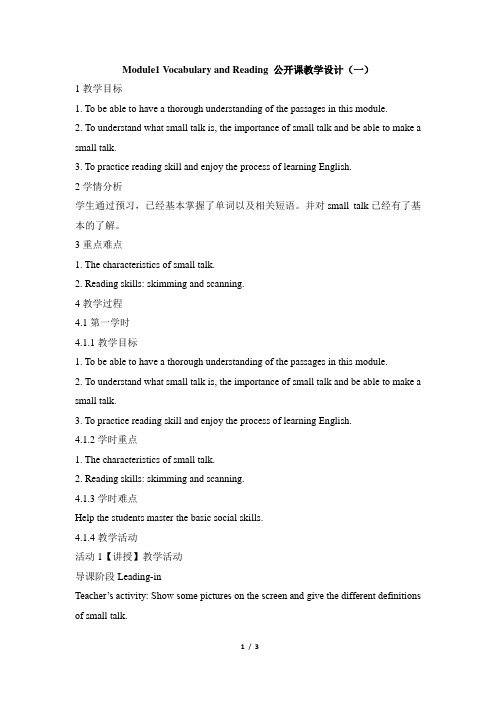
Module1 Vocabulary and Reading 公开课教学设计(一)1教学目标1. To be able to have a thorough understanding of the passages in this module.2. To understand what small talk is, the importance of small talk and be able to make a small talk.3. To practice reading skill and enjoy the process of learning English.2学情分析学生通过预习,已经基本掌握了单词以及相关短语。
并对small talk已经有了基本的了解。
3重点难点1. The characteristics of small talk.2. Reading skills: skimming and scanning.4教学过程4.1第一学时4.1.1教学目标1. To be able to have a thorough understanding of the passages in this module.2. To understand what small talk is, the importance of small talk and be able to make a small talk.3. To practice reading skill and enjoy the process of learning English.4.1.2学时重点1. The characteristics of small talk.2. Reading skills: skimming and scanning.4.1.3学时难点Help the students master the basic social skills.4.1.4教学活动活动1【讲授】教学活动导课阶段Leading-inTeacher’s activity: Show some pictures on the screen and give the different definitions of small talk.Students’ activity:Discuss who make, and where and why people make small talk. 授课阶段:教学内容(一)PresentationTeacher’s activity 1: V ocabulary test.Students’ activity 1: Speak out the meaning of the vocabulary.Teacher’s activity 2: Hand out the answer sheet.Students’ activity 2: Check the answers of assignment.Teacher’s activity 3: Explain the difficult questions.Students’ activity 3: Try to polish the sentences on the screen.教学内容(二)PresentationTeacher’s activity 1: Show Ss the requirements of crazy Engli sh.Students’ activity 1: Recite the phrases.Teacher’s activity 2: Test.Students’ activity 2: Play a game.Teacher’s activity 3: Assign the Ss to read the article and discuss the questions with their partners.Students’ activity 3: Read the article and discuss the questions group.评学阶段Teacher’s activity : Require Ss to write a short conversation to give Esther some suggestions on how to give small talk.Students’ activity: Give some suggestions to Esther and polish them, then present to others.课后作业Finish the conversation in full length.4.2第二学时4.2.1教学目标1. To be able to have a thorough understanding of the passages in this module.2. To understand what small talk is, the importance of small talk and be able to make a small talk.3. To practice reading skill and enjoy the process of learning English.4.2.2学时重点1.Help the students master the important phrases and sentence pattern.2.Help the students master the basic reading skills.4.2.3学时难点1. Phrases and sentence pattern.4.2.4教学活动。
外研版高中英语选修六Module 1Small TalkReading and Writing教案1
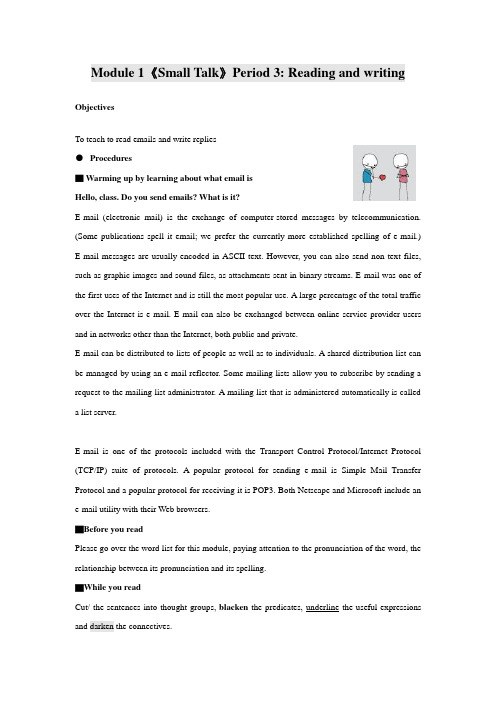
Module 1《Small Talk》Period 3: Reading and writing ObjectivesTo teach to read emails and write replies●Procedures▇ Warming up by learning about what email isHello, class. Do you send emails? What is it?E-mail (electronic mail) is the exchange of computer-stored messages by telecommunication. (Some publications spell it email; we prefer the currently more established spelling of e-mail.) E-mail messages are usually encoded in ASCII text. However, you can also send non-text files, such as graphic images and sound files, as attachments sent in binary streams. E-mail was one of the first uses of the Internet and is still the most popular use. A large percentage of the total traffic over the Internet is e-mail. E-mail can also be exchanged between online service provider users and in networks other than the Internet, both public and private.E-mail can be distributed to lists of people as well as to individuals. A shared distribution list can be managed by using an e-mail reflector. Some mailing lists allow you to subscribe by sending a request to the mailing list administrator. A mailing list that is administered automatically is called a list server.E-mail is one of the protocols included with the Transport Control Protocol/Internet Protocol (TCP/IP) suite of protocols. A popular protocol for sending e-mail is Simple Mail Transfer Protocol and a popular protocol for receiving it is POP3. Both Netscape and Microsoft include an e-mail utility with their Web browsers.▇Before you readPlease go over the word list for this module, paying attention to the pronunciation of the word, the relationship between its pronunciation and its spelling.▇While you readCut/ the sentences into thought groups, blacken the predicates, underline the useful expressions and darken the connectives.▇After you readCopy all the useful expressions into your Expression Book and make your own sentences with them.■Writing a reply■Learning about the tips of writing effective emails ■Here are ten tips for writing effective emails.*Write a meaningful subject line.*Keep the message focused and readable.*Avoid attachments.*Identify yourself clearly.*Be kind -- don't flame.*Proofread.*Don't assume privacy.*Distinguish between formal and informal situations. *Respond Promptly.*Show Respect and Restraint.。
高二外研版选修6Module1SmallTalk教案

高二外研版选修6Module1SmallTalk教案Module 1 Small Talk Ⅰ. 模块教学目标Ⅱ.目标语言Ⅲ.教材分析与教材重组1. 教材分析本模块以Small Talk为话题,旨在通过教学,使学生对各种不同的闲聊话题、技巧、注意事项、社交方法、规则等加以了解并能够学会用small talk和别人进行交流。
学会使用非正式的日常用语;能正确运用“责任义务和无责任义务”的表达法;学会读、写电子邮件。
1.1 INTRODUCTION提供了四本权威词典对small talk的解释,让学生了解small talk的含义、small talk涉及的话题以及small talk 和serious talk的区别。
1.2 VOCABULARY AND READING是一篇介绍社交技巧的说明文。
文中介绍了交际活动中应注意的事项、社交技巧等。
1.3 FUNCTION 部分学习“责任义务和无责任义务”的表达法。
1.4 READING AND LISTENING部分要求学生朗读三段对话,选出对话发生的地点;根据对话内容回答问题;并通过听取对话录音回答问题、完成句子。
1.5 GRAMMAR学习并使用didn’t need to和needn’t have done结构。
1.6 READING AND WRITING 要求学生阅读并回复网友的电子邮件。
1.7 EVERYDAY ENGLISH 学习非正式交际用语中词汇的省略法。
1.8 SPEAKING 部分要求学生根据问题和提示,以small talk为话题展开小组活动并继续READING AND LISTENING中的对话。
1.9 CULTURAL CORNER部分介绍了英语国家“small talk”的一种较为成功的模式——AAA model.1.10 TASK部分要求学生在掌握small talk相关知识的基础上,收集课内外small talk中经常使用的表达并鼓励学生实现资源共享,编写一个供全班同学使用的小册子。
高中英语外研版选修6【教学设计】Module 1

Module 1 Small Talk本模块以Small Talk 为话题,旨在通过教学,使学生对各种不同的闲聊话题、技巧、 事项、社交方法、规则等加以了解并能够学会用small talk 和别人进行交流。
学会使用 式的日常用语;能正确运用“责任义务和无责任义务”的表达法;学会读、写电子邮件。
【知识目标】Key vocabulary: apologize, circumstance, formula, function, obligation, prize, purpose, refund, reply; be nervous about, body language, find out, get used to, in addition, leave out, look away from, make friends with, social rules, small talk, think ofKey structures: You must ...;You have to ...;You mustn’t ...You don’t have to ...You don’t need to ...You needn’t have ...You didn’t need to ...【能力目标】3. Learn something about social skills4. Learn to talk about obligation or lack of obligation5. Learn to write an e-mail to a pen friend【情感目标】Learn to talk with others.【教学重点】Let the students learn to talk about small talk.【教学难点】Learn to make small talk and use the str ucture “didn’t need to do and needn’t have done”.Tape recorder, MultimediaStep 1. Introduction & Reading1. Look at the two pictures and make a dialogue for each one.2. DiscussionLook at these pictures. Have a discussion about where and what they are doing.3. BrainstormRead these words and think about how we use them in a conversation.4. DiscussionDo you think they are small talks?What is a small talk?Can you find the definitions in the dictionaries?Divide the topics into two groups7. DiscussionLook at the chart and talk with your partner about your opinions.Step 2. Vocabulary and reading1. DiscussionLook at the title:2. Read the passage and decide what kind of book it is from.。
外研版高中英语选修6全册教案
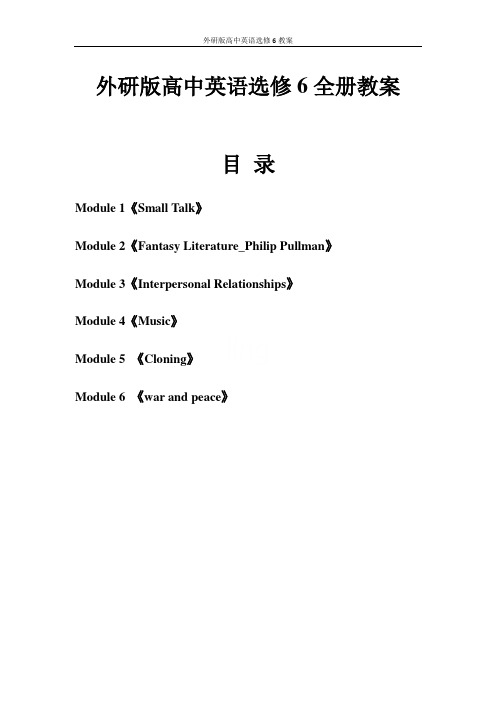
外研版高中英语选修6全册教案目录Module 1《Small Talk》Module 2《Fantasy Literature_Philip Pullman》Module 3《Interpersonal Relationships》Module 4《Music》Module 5 《Cloning》Module 6 《war and peace》Module 1 Small TalkTeaching aims:1. To introduce different social skills about talking in different culture and improve the students’ social skills.2. To know how to talk about obligation or lack of obligation.3. To master AAA talking model and to develop the friendly environment whenhaving talk with others.Important and difficult points:1. Get students to understand how to have a chat with others in English culture.2. Make students know the importance of small talk between persons.3. Help students to improve the cultural understanding skills in different countries.Teaching procedures:Step 1. In this part, the teacher can talk with students in small talk, and the teacher can choose different topic with different students.For example:T: What do you think of yesterday’s football match between your class and Class 3?S1: It’s great.S2: We won.T: Do you know why you won?S3: We are strong.T: Good. When we were discussing the football match just now, we were discussing serious things or having light conversation?Ss: Light conversation.T: Oh, yes. Just small talk.Step 2. After the teacher tell the students small talk, the students begin to read the dictionary definitions of small talk then ask the students to discuss the four questions inActivity1.Step 3. Divide the students into groups of two ones to discuss the five questions in Activity2. Then the teacher can choose some groups of students to show their smalltalk to all the students. The Ss can have different opinions, but they must give the reason for their opinions.Step 4. Make a talk between the Ss and the teacher, then introduce the topic about must, have to, don’t have to and mustn’t.For example:T: You are now in Senior Two, and I think you are all good students, although some of you sometimes behave not very properly. So I’m going to ask you some questions. Do you think students have to be on time at school?Ss: …T: Oh, yes. You are right. You have to. Then say something that you must do.S1: …S2: …T: And anything you mustn’t do?S1: …S2:…Ask the Ss to talk about the following topics:What is obligation?What is lack of obligation?According to the talking method, the teacher can introduce the definitions of obligation and lack of obligation.Step 5. Ask the students to finish Activity1 and then let the Ss to talk about the answers they have made.Ask the Ss to make similar sentences impressing obligation and lack of obligation using the words they just practiced.Step 6. Make a competition among the Ss to make sentences using must, have to, don’t have to, mustn’t, needn’t do and don’t need do. And the team which make sentences will win the competition.Step 1. Ask Ss to discuss the sentences in Activity 1 and then check the answers of the Ss’. Then learn the words in this part with the Ss.Step 2. Ask the Ss to read the text quickly and then finish Activity2. Then ask all the Ss to discuss the questions of Activity 4. Then ask the Ss to tell us the usage of the words in Activity1 and Activity 4 and find the sentences in the text: impress, damage, encourage, prepare, avoid, lack, recognize, smile.Step 3. Ask the students to read the text again, then answer the questions in Activity3 and encourage the Ss to have different answers. If the time isn’t enough, we can solve the problem in the following ways.(1)Discuss it after class.(2)Discuss the following questions as the important points.I.What do people think about those who talk too much?II.Why is it a good idea to nod and smile when the other person is talking?III.What does the quotation from Benjamin Disraeli tell you about people? Then ask the Ss to prepare for Activity5 and then ask the Ss to tell the meanings of the phrases.Step 4. Important word or phrases1. Which definitions make small talk sound like a positive thing?Sound is a link verb,its meaning in Chinese:听起来。
高二英语选修6 模块1教案3

Period 2: FUNCTION—Talking about obligation or lack ofobligationObjectivesTo learn to talking about obligation or lack of obligation●Procedures▇ Warming up by learning about what is obligationHello, class. We shall learn to talk about “obligation” or lack of “obligation”. But first what is “obligation” ?It is a noun, meaning1. A moral or legal duty or tie.2. The binding power of such a duty or tie.3. A debt of gratitude for a service.Example:be under obligation to herIf you have not signed a contract, you are under no obligation to (= it is not necessary to) pay them any money.You have a legal obligation to (= The law says you must) ensure your child receives a proper education.I haven't got time to do his work for him - I've got too many obligations as it is.A tender conscience is a stronger obligation than a prison.Every man has obligations which belong to his station.Duties extend beyond obligation, and direct the affections, desires, and intentions, as well as the actions.■Talking about obligation or lack of obligation◆100% necessity:You must leave straight away.You have [got] to leave straight away.must v. have [got] toGenerally, must shows what the speaker feels and it is the speaker's authority; have [got] to is when the speaker uses an external force which they cannot control:doctor to patient: You've got to stop smoking.patient to themself: I must stop smoking.◆0% necessity:We don't have to pay to get in.We have not got to see the boss after all.We needn't stay late.These have an element of being optional, i.e. we needn't stay late but we can if we want to.◆obligation:You ought to call your mother.You should call your mother.These show that calling your mother is the right thing to do. There is no real difference between ought to and should, but ought to is perhaps a little stronger.We use needn't to show an action is optional - I can do it if I want to. We use mustn't to say an action is forbidden - I have no choice.■Making a dialogue talking about obligation or lack of obligationA: I have to work all day long tomorrow.B: You mustn't work all the time. You will ruin your health.A: Must I return the book tomorrow?B: Yes, you have to.A: He had to go because of somebody's calling him that day.B: I don’t think so. He could call back.A: I have lots of work to do. I don’t like to work on Sundays.B: You must do it now.A: I have to go now.B: But you must stay till he comes.A: Need I attend the meeting tomorrow?B: No, you needn’t. You could read my notes taken at the meeting then.A: Must I hand in the paper this week?B: No, you needn’t. You need not hand in the pap er this week.A: You ought to read these books if you want to know how to repair the motorcar. B: But I have no time to read them.A: You ought to bring the child here.B: All right. I will.A: You ought to have been here yesterday.B: But there have been much traffic.A: You ought not to have taken the book out of the reading-room.B: I did not know about the rules here.A: I have to go now.B: But you have to cook for my child.A: You must be here on time next time.B: Certainly. But we must go to get the timetable ourselves.。
2021年高中英语外研选修6学案Module1-SectionⅢ
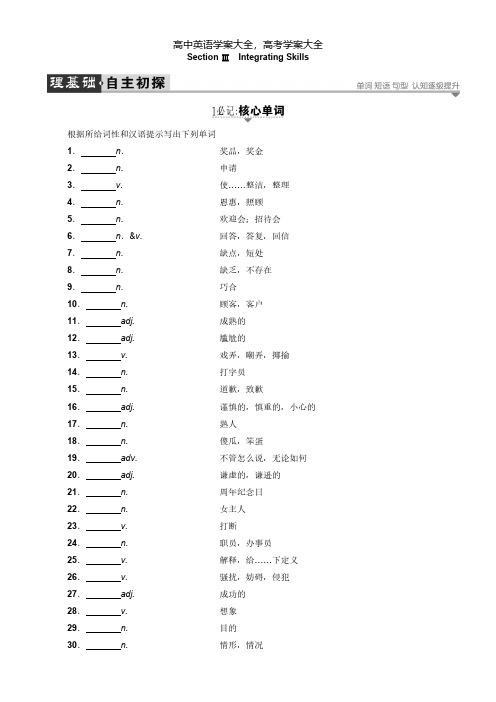
Section Ⅲ Integrating Skills根据所给词性和汉语提示写出下列单词1.n.奖品,奖金2.n.申请3.v.使……整洁,整理4.n. 恩惠,照顾5.n. 欢迎会;招待会6.n.&v. 回答,答复,回信7.n. 缺点,短处8.n. 缺乏,不存在9.n. 巧合10.n. 顾客,客户11.adj.成熟的12.adj.尴尬的13.v. 戏弄,嘲弄,揶揄14.n. 打字员15.n. 道歉,致歉16.adj.谨慎的,慎重的,小心的17.n. 熟人18.n. 傻瓜,笨蛋19.adv. 不管怎么说,无论如何20.adj.谦虚的,谦逊的21.n. 周年纪念日22.n. 女主人23.v. 打断24.n. 职员,办事员25.v. 解释,给……下定义26.v. 骚扰,妨碍,侵犯27.adj.成功的28.v. 想象29.n.目的30.n.情形,情况【答案】 1.prize 2.application 3.tidy 4.favour 5.reception 6.reply 7.shortcoming 8.absence 9.coincidence 10.customer 11.mature 12.awkward 13.tease 14.typist 15.apology 16.cautious 17.acquaintance 18.fool 19.anyhow 20.modest 21.anniversary 22.hostess 23.interrupt 24.clerk 25.define 26.violate 27.successful 28.imagine 29.purpose 30.circumstance根据提示补全下列短语1.show 炫耀2.as consequence因此,结果3.cheer sb. 使人高兴/振作起来4.leave 省去,删去5.do sb. a 帮某个人的忙6.be cautious 对……小心谨慎7.(be)aware 知道8.go 经历,经受【答案】 1.off 2.a 3.up 4.out 5.favour6.about 7.of 8.through根据提示补全下列教材原句1.Her motto was“ I open my mouth,I put my foot in it.”她的“座右铭”是“每当我开口,就会讲错话”。
外研版高中英语选修六Module 1Small TalkReading教案3
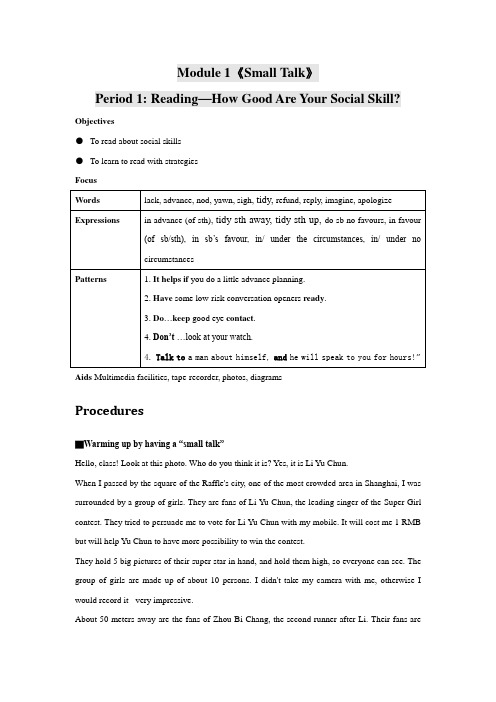
Module 1《Small Talk》Period 1: Reading—How Good Are Your Social Skill? Objectives●To read about social skills●To learn to read with strategiesFocusAids Multimedia facilities, tape-recorder, photos, diagramsProcedures▇Warming up by having a “small talk”Hello, class! Look at this photo. Who do you think it is? Yes, it is Li Yu Chun.When I passed by the square of the Raffle's city, one of the most crowded area in Shanghai, I was surrounded by a group of girls. They are fans of Li Yu Chun, the leading singer of the Super Girl contest. They tried to persuade me to vote for Li Yu Chun with my mobile. It will cost me 1 RMB but will help Yu Chun to have more possibility to win the contest.They hold 5 big pictures of their super star in hand, and hold them high, so everyone can see. The group of girls are made up of about 10 persons. I didn't take my camera with me, otherwise I would record it - very impressive.About 50 meters away are the fans of Zhou Bi Chang, the second runner after Li. Their fans aredoing the same. The hot compon has urged many fans go to the street and ask people passing by to send SMS for their supported girl.Last week, Li Yu Chun got 1.8 million SMS support from every corner of the country. I get this week, this number may double since it is the final and 2 more left the game and there is only 3 persons in the show. Last week, Li Yu Chun helped China Mobile, SP and Hunan TV to win almost 2 million RMB from SMS only. That is amazing.It's just like a president election. Super Girl is a vivid marketing, planning case study for business persons around the country.By the way, what I talk to you just now is an example of “small talk”. Let’s turn to page 1 to learn more about it.■Discussing how to make small talkSmall talk can be a big challenge, but a little preparation and confidence is all you need.★Steps:1. Practice. Converse with everyone you come across: cashiers, waiters, people you're in line with, neighbors, co-workers and kids. Chat with folks unlike yourself, from seniors to teens to tourists.2. Read everything: cookbooks, newspapers, magazines, reviews, product inserts, maps, signs and catalogs. Everything is a source of information that can be discussed.3. Force yourself to get into small talk situations, like doctors' waiting rooms, cocktail parties and office meetings. Accept invitations, or host your own gathering.4. Immerse yourself in culture, both high and low. Television, music, sports, fashion, art and poetry are great sources of chat. If you can't stand Shakespeare, that too is a good topic for talk.5. Keep a journal. Write down funny stories you hear, beautiful things you see, quotes,observations, shopping lists and calls you made. That story of the long-distance operator misunderstanding you could become an opening line.6. Talk to yourself in the mirror. Make a random list of topics and see what you have to say on the subjects. Baseball, Russia, butter, hip-hop, shoes ... the more varied your list, the better.7. Expand your horizons. Go home a new way. Try sushi. Play pinball. Go online. Paint a watercolor. Bake a pie. Try something new every day.8. Be a better listener. Did your boss just say she suffers from migraines? Did your doctor just have twins? These are opportunities for making small talk.9. Work on confidence, overcoming shyness and any feelings of stage fright. Remember, the more you know, the more you know you can talk about.★Tips:﹡Be yourself. Keep in mind that confidence and humor are superb substitutes for comedic genius or wit.﹡Remember, you never have to do it alone.﹡Keep a few exit lines in mind too. For example, "Thanks for the wonderful chat, but I must make believe I'm interested in everybody else. Tee hee."▇Before you readWe have come to page 2 to read the text How Good Are Your Social Skill? But first please go over the word list for this module, paying attention to the pronunciation of the word, the relationship between its pronunciation and its spelling.▇While you readNow the text. While reading try to cut/ the sentences into thought groups, blacken the predicates, underline the useful expressions and darken the connectives.▇After you readTry to find time to copy all the useful expressions into your Expression Book and make your own sentences with them.■Reading the text again to fill in the necessary information■Closing down by practicing small talksSmall Talk: Conversation StartersTalking about the weather •Beautiful day, isn't it?•Can you believe all of this rain we've been having? •It looks like it's going to snow.•It sure would be nice to be in Hawaii right about now.•I hear they're calling for thunderstorms all weekend. •We couldn't ask for a nicer day, could we?•How about this weather?•Did you order this sunshine?Talking about current events •Did you catch the news today?•Did you hear about that fire on Fourth St?•What do you think about this transit strike?•I read in the paper today that the Sears Mall is closing.•I heard on the radio today that they are finally going to start building the new bridge.•How about those Reds? Do you think they're going to win tonight?At the office•Looking forward to the weekend?•Have you worked here long?•I can't believe how busy/quiet we are today, can you?•Has it been a long week?•You look like you could use a cup of coffee.•What do you think of the new computers?At a social event •So, how do you know Justin?•Have you tried the cabbage rolls that Sandy made?•Are you enjoying yourself?•It looks like you could use another drink.•Pretty nice place, huh?•I love your dress. Can I ask where you got it?Out for a walk•How old's your baby?•What's your puppy's name?•The tulips are sure beautiful at this time of year, aren't they.•How do you like the new park?•Nice day to be outside, isn't it?Waiting somewhere●I didn't think it would be so busy today.●You look like you've got your hands full (with children orgoods).●The bus must be running late today.●It looks like we are going to be here a while, huh?●I'll have to remember not to come here on Mondays.●How long have you been waiting?。
- 1、下载文档前请自行甄别文档内容的完整性,平台不提供额外的编辑、内容补充、找答案等附加服务。
- 2、"仅部分预览"的文档,不可在线预览部分如存在完整性等问题,可反馈申请退款(可完整预览的文档不适用该条件!)。
- 3、如文档侵犯您的权益,请联系客服反馈,我们会尽快为您处理(人工客服工作时间:9:00-18:30)。
[语法初识]原句感知自主探究①In some countries, for example, youhave to arrive on time at a party; in other countries, you don't need to (不必).1.①②句中的need为实义动词,③④句中的need为情态动词;②My American friend Tom spoke good Chinese, so I didn't need to translate(没必要翻译) the speech for him.③Some hosts expect flowers or a small gift, but in other places, you can take things, but you needn't(不必)if you don't want to.④I was the first to go there. I needn't have gone (本不必去) there so early. 2.②句中 didn't need to do表示“过去没必要,实际上也没做某事”;④句中needn't have done表示“过去虽然没必要,但已经做了某事”。
[语法剖析]语法点一need的用法1.用作实义动词(1) 有人称和数的变化,其第三人称单数形式为needs,变为否定句或疑问句时要用助动词do/does/did。
(2)后跟名词、代词、不定式或动名词作宾语,当need的主语与need后面的动词之间是被动关系时,need后面接不定式的被动形式或动名词的主动形式。
You don't need to worry about me.你不必担心我。
The room needs cleaning/to be cleaned, but I only have time on Sunday.房间需要打扫,但是我只有星期天有空。
2.用作情态动词(1)need表示“需要”或“必须”,通常用于否定句和疑问句。
You needn't do it again.你不必再做了。
Need he do his homework first?他需要先做作业吗?(2)由must引起的一般疑问句中,否定答语可用needn't, 意为“没必要”。
—Must I do the work now?—No, you needn't.——我现在必须做这项工作吗?——不,你不必。
(3)在need引起的一般疑问句中,肯定回答用must,否定回答用needn't。
—Need I go there too?—Yes, you must./No, you needn't.——我也需要去那儿吗?——是的,你必须去。
/不,你不必去。
集中演练1①—I'm sorry I will be very busy tomorrow.—If so, you didn't need to come.didn't need to→needn't②As a result of the serious flood, two thirds of the buildings in the area need repair.repair→repairing/to be repaired③—Must I hand in the paper before Friday?—No, you mustn't.mustn't→needn't④I couldn't use a clock to wake me up every morning because I am always woken up by my mother.couldn't→needn't⑤Dr. Smith needed (需要) no payment for his work.⑥We need to (需要) make sure our plan will be well carried out.⑦—Must I answer the question?—No, you needn't (不必).⑧You don't need to (不需要) have the bike repaired right away.⑨The flowers need watering/to be watered (需要浇水) now.⑩Come on, you needn't worry about (不必担心) it because it's not your fault.1.didn't need to do表示“过去没必要做某事,实际上也没做”。
You didn't need to buy the book; it was complex to understand.你不必买那本书;它太复杂了,很难懂。
Mary's boyfriend drove to pick her up, so she didn't need to take a taxi.玛丽的男朋友开车去接她,因此她没必要打出租车了。
2.needn't have done表示“过去没必要做某事,而实际上做了”。
You needn't have washed those clothes; we have a washing machine to do that sort of thing. 你本不必洗那些衣服的,我们有台洗衣机可以洗衣服。
I needn't have cooked so much food, but I didn't know nobody was hungry.我本没必要弄那么多吃的,但我当时不知道谁也不饿。
[名师点津] didn't need to do sth.仅仅陈述过去的情形;needn't have done sth.含有惋惜、遗憾、后悔等含义。
集中演练2①I got up early this morning, but I didn't need to do so, because I had no classes. didn't need to do→needn't have done②I'll look after him tonight, so you needn't have come to the hospital.去掉have③We had already booked a table in the restaurant, so we don't need to wait in line.don't →didn't④I got to the meeting room at 10:00 am, but there was no one there, so I couldn't have arrived so early.couldn't→needn't⑤I bought some apples but later I found there had been many in the fridge, so I needn't buy any.buy→have bought⑥My friend sent me the book, so I didn't need to (没必要) write to him to ask for it.⑦I dressed very warmly for the trip, but I needn't have done (本没有必要做) so because it was very hot.⑧I needn't have written (本不必写信) to him because he phoned me shortly afterwards.⑨I didn't need to get up (不必起床) early this morning, so I stayed in bed until 10:00am.[链接高考]完成句子1.(2015·天津高考)来新学校前我本没有必要担心的,因为这里的同学都对我很友好。
I needn't have worried before I came to the new school, for my classmates here are very friendly to me.2.(2014·重庆高考)我已经订了一些比萨饼,所以当我们到家疲惫时就不必担心做饭的事了。
I've ordered some pizza, so we needn't worry about cooking when we get home tired.3.(2012·全国卷Ⅰ)我不需要用闹钟来叫醒我,因为每天早晨六点钟,火车就从我家附近经过。
I needn't use a clock to wake me up because at six o'clock each morning the train comes by my house.4.(2012·江西高考)既然苏西不和我们一起吃饭,我们没必要买如此多的食物。
We needn't have bought so much food now that Suzie won't be with us for dinner. 5.(2012·天津高考)这儿相当暖和;我们没必要开暖气。
It's quite warm here; we needn't turn the heating on yet.[针对演练]Ⅰ.单句语法填空1.I watered the flowers this morning, but it rained at 9:00 am, so I needn't have watered (not water) them.2.Happiness is for everyone. You don't need to care (not care) about the rich. 3.—Helen has gone to New York.—Well, she needn't have left (not leave) her hometown for New York, because there are plenty of jobs available.4.We were told that the flight had been put off when we arrived at the airport, so we needn't have arrived (not arrive)here so early.5.I was a little nervous when I announced my engagement to Grace, but it turned out that I needn't have worried (not worry).6.Peter bought a new bike by doing a part time job in summer holidays, so I didn't need to lend (not lend) money to him.7.The classes were cancelled due to the terrible typhoon, so the students didn't need to go (not go) to school.8.Mrs White's son had the grass cut, so she didn't need to do (not do) it.9.You didn't need to go (not go) to the bank after I lent you some money.10.—I told the good news to Mrs. Brown.—You needn't have told (not tell) her, because she has already known it from the school office.Ⅱ.完成句子1.你本来没必要那么匆匆地赶到公司,因为会议已经取消了。
